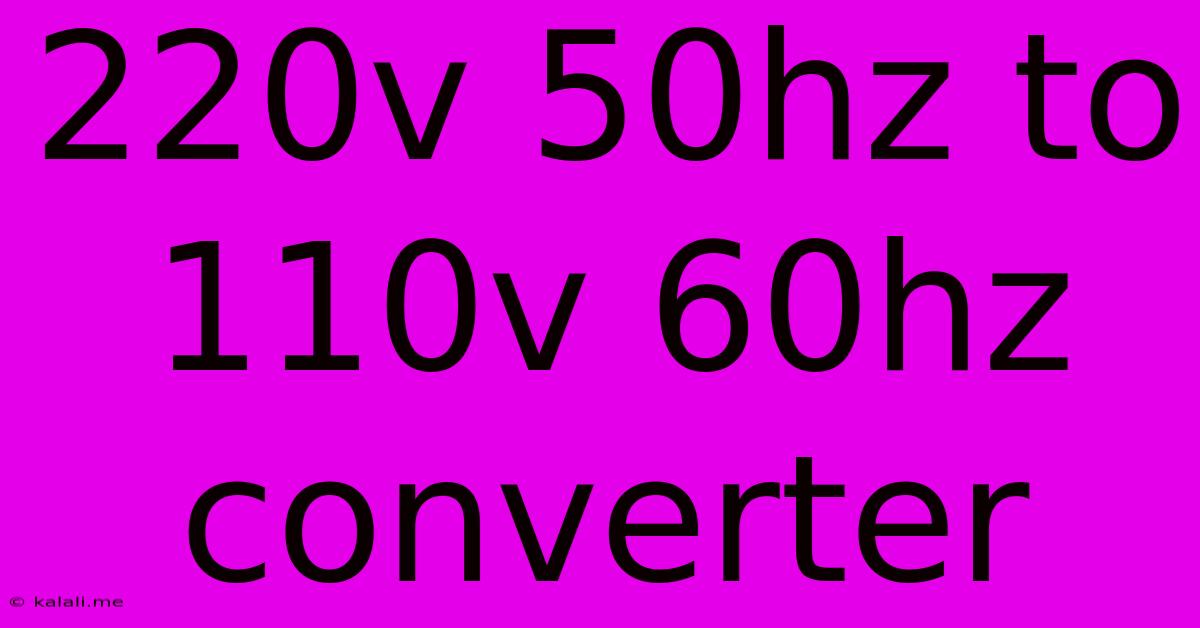220v 50hz To 110v 60hz Converter
Kalali
May 25, 2025 · 3 min read

Table of Contents
220V 50Hz to 110V 60Hz Converter: A Comprehensive Guide
Are you planning an international move or simply need to power a North American appliance in a region with a different electrical system? Understanding the differences between 220V 50Hz and 110V 60Hz power is crucial. This article provides a comprehensive guide to 220V 50Hz to 110V 60Hz converters, explaining how they work, what to consider when choosing one, and potential pitfalls to avoid.
What's the Difference Between 220V 50Hz and 110V 60Hz?
The key differences lie in voltage and frequency:
- Voltage: 220V systems deliver twice the voltage as 110V systems. This means appliances designed for 220V will likely be damaged if plugged into a 110V outlet, and vice versa.
- Frequency: 50Hz refers to the alternating current (AC) cycle completing 50 times per second, while 60Hz completes 60 times per second. This frequency difference can impact the performance of some motors and electronic devices. Some appliances might hum, run slower, or even fail to operate correctly if the frequency isn't matched.
How a 220V 50Hz to 110V 60Hz Converter Works
These converters perform two critical functions:
- Voltage Transformation: They step down the voltage from 220V to 110V using a transformer. This is the most important function.
- Frequency Conversion (Sometimes): True frequency converters are more complex and expensive. Many devices marketed as converters only handle voltage transformation. This means your appliance will still operate at 50Hz, which might affect its performance, especially for motors. Look for a "frequency converter" specifically if you need 60Hz output.
Choosing the Right Converter: Key Considerations
Several factors determine the appropriate converter:
- Wattage (Power Rating): This is the most crucial specification. The converter's wattage must exceed the appliance's wattage requirements. Underpowering can damage both the converter and the appliance. Always add a safety margin.
- Frequency Conversion: Decide whether you need a true frequency converter (more expensive) or if voltage conversion alone will suffice. Check your appliance's manual for frequency sensitivity.
- Input and Output Plugs: Ensure compatibility with your local outlets and the appliance's plug type. Adapters might be needed separately.
- Surge Protection: Look for converters with built-in surge protection to safeguard your appliances from power surges.
- Efficiency and Heat Dissipation: Converters generate heat. A well-designed converter will have good heat dissipation to prevent overheating.
Potential Pitfalls to Avoid
- Overloading: Never exceed the converter's rated wattage.
- Incorrect Wiring: Improper wiring can lead to serious safety hazards.
- Ignoring Frequency: Failing to account for frequency differences can cause appliance malfunction.
- Cheap Converters: Low-quality converters might lack safety features or be inefficient.
Alternatives to Converters:
- Using a Transformer Only (for voltage conversion): If your appliance isn't sensitive to frequency, a simple step-down transformer might be sufficient.
- Dual Voltage Appliances: Consider purchasing appliances with dual-voltage capabilities, which can handle both 110V and 220V.
Conclusion:
Choosing the right 220V 50Hz to 110V 60Hz converter requires careful consideration of wattage, frequency requirements, and safety features. Investing in a high-quality converter will protect your valuable appliances and ensure their proper operation. Always prioritize safety and choose a converter that meets your specific needs. Remember to check your appliance's specifications before making a purchase.
Latest Posts
Latest Posts
-
How To Find The Size Of Your Backpack
May 25, 2025
-
Can Anything Good Come From Nazareth
May 25, 2025
-
How To Keep Birds From Hitting Windows
May 25, 2025
-
What Temp Is A Pork Butt Done
May 25, 2025
-
How To Get Rid Of Scratches On Stainless Steel
May 25, 2025
Related Post
Thank you for visiting our website which covers about 220v 50hz To 110v 60hz Converter . We hope the information provided has been useful to you. Feel free to contact us if you have any questions or need further assistance. See you next time and don't miss to bookmark.